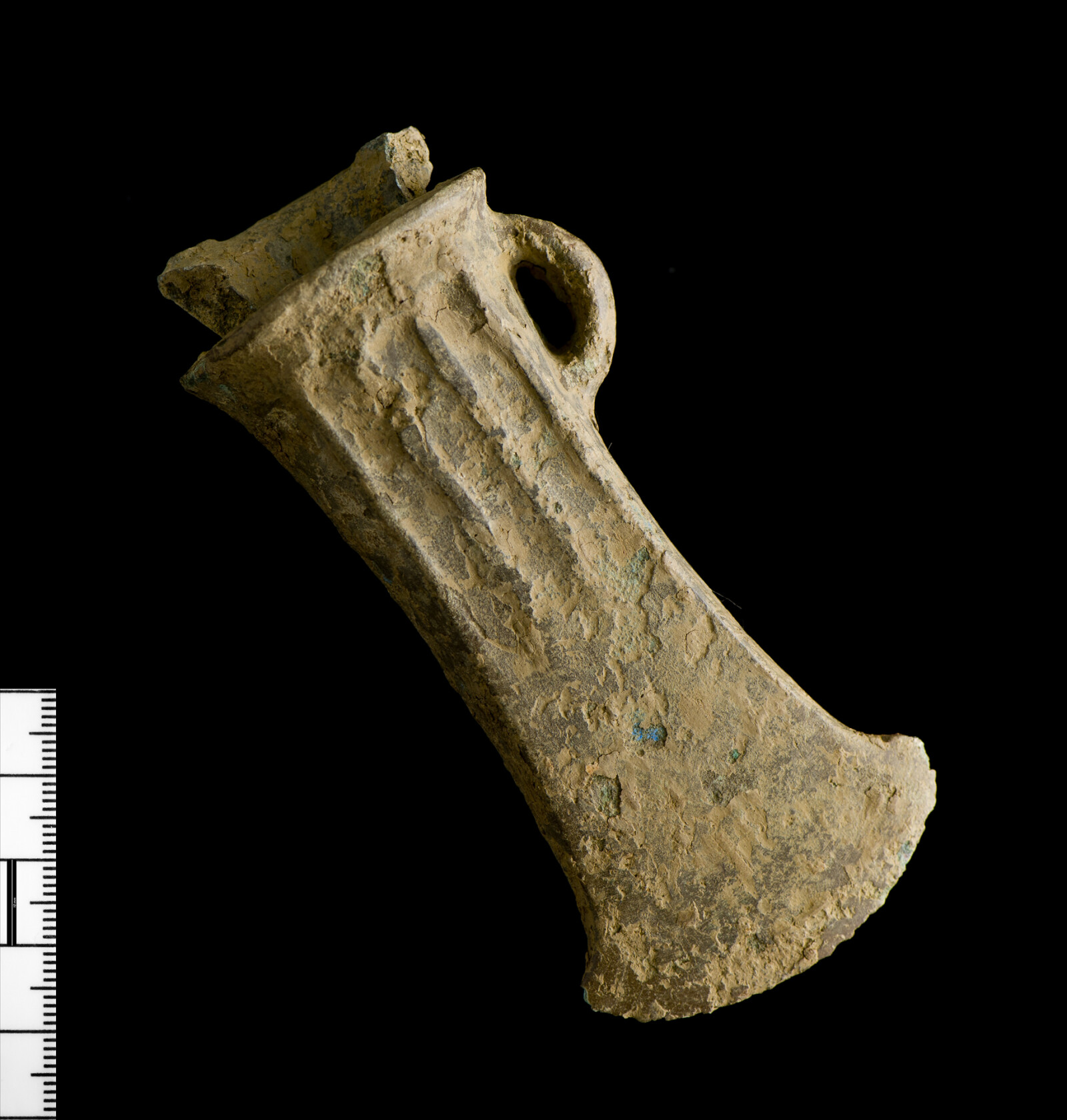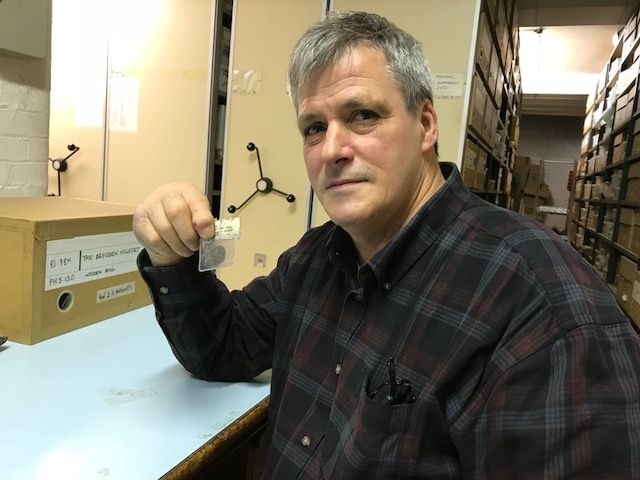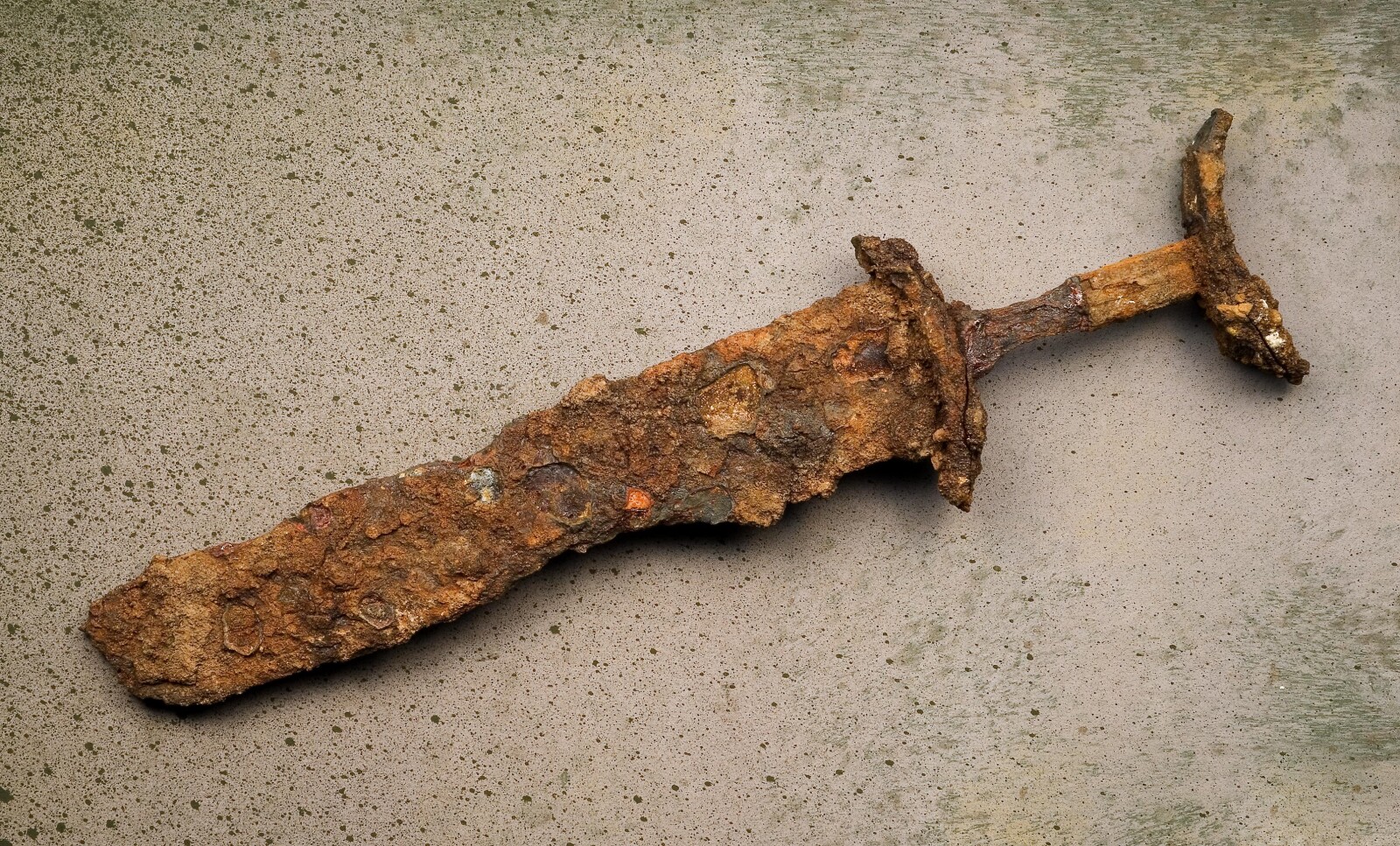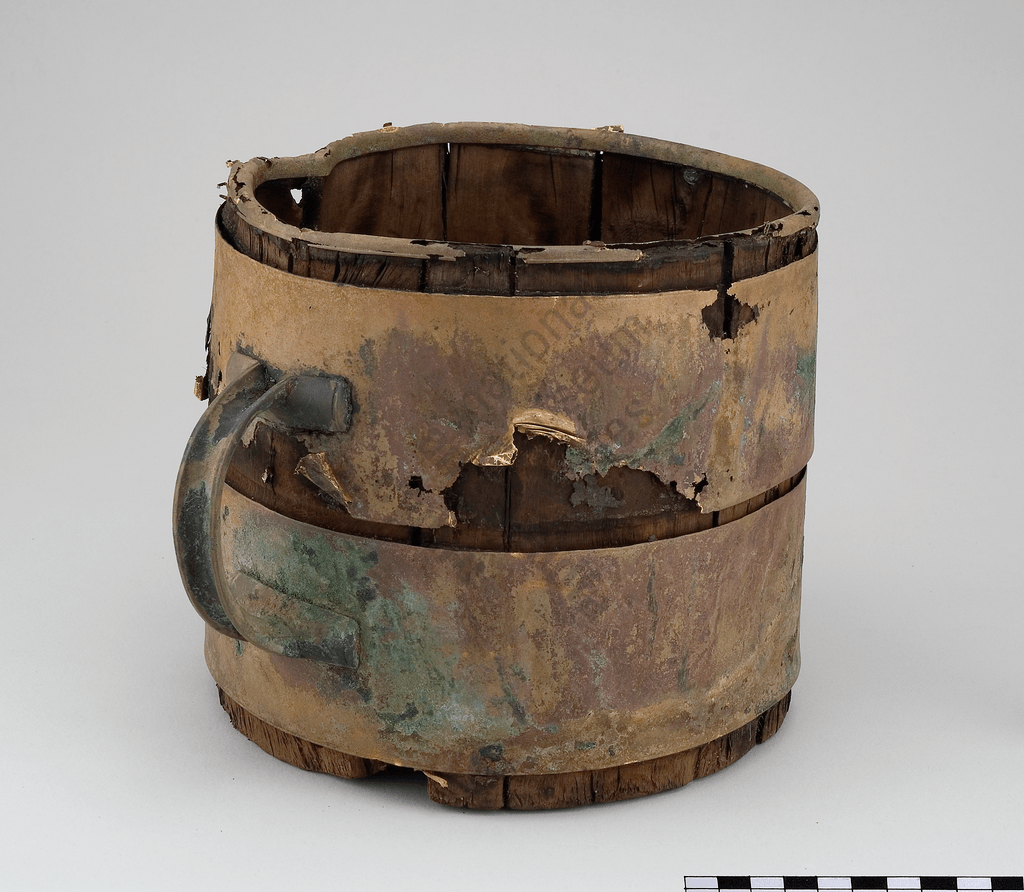Behind the scenes with Brecon’s metal detectorists
, 23 Mai 2018
The National Museum Cardiff was happy to host a behind the scenes tour to Brecon Detectorists, a group of keen treasure hunters who jumped at the opportunity to delve into the Amgueddfa Cymru – National Museum Wales archives.
David Hingley set up Brecon Metal Detecting club in 2011 and is enthusiastic about promoting responsible metal detecting to its members. “Everyone who comes through that door has a condition of membership – everything over a certain age has got to be registered for the Portable Antiquities Scheme, I insist upon it,” David explains. “We’re a small club, we’ve basically capped ourselves at 10. At the moment we’re 9, we’ve had a new guy just started, the big fella, Tom.”
And newcomer, Tom Haines, is no stranger to historical finds. Even before joining the club, he shared David’s passion for responsible detecting. While out walking his dog one day last year, Tom discovered a Bronze Age knife; which he reported to the Portable Antiquities Scheme so it could be properly excavated.
“By reporting it, archaeologists might want to dig it, and that ended up being the case,” he recalls. “I could have taken it home, plonked it in my own collection and no one would have learnt anything from it and it would have just crumbled away. It’s being properly preserved and looked after and archaeologists can learn a lot from it.”
The knife was just the tip of the iceberg, however, and his discovery led archaeologists to unearth a Bronze Age burial site, complete with cremated human remains. “They found a bronze age pin in there so it was a good thing that I didn’t disturb that!” The knife and pin, as well as the urn in which they (and charred bone) were discovered is currently pending through the treasure process. The hoard will likely be acquired by Brecon Museum thanks to the Saving Treasures* project.
It’s this interest in preserving archaeological artefacts that brought the club to the museum – to discover just how important their finds can be to museum researchers, conservationists and of course, archaeologists and historians.
The club’s tour kick started in the stores with Portable Antiquities Scheme Wales Liaison Officer, Mark Lodwick, where they were able to view and handle some fascinating Bronze Age axe heads. Among them was a ribbed socketed axe head found in Llancarfan, Vale of Glamorgan back in 2013 that was curiously stuffed with another, bent axe head and (seemingly) ritualistically buried.
From the stores, the group moved onto the conservation labs. Conservationists Louise Mumford and Owen Lazzari were on hand to answer any queries they may have when it comes to storing their non-treasure finds and show the club some exciting pieces they are currently working on. One of the most impressive pieces was a Viking period sword from Hawarden, which had been wrapped in textile and showed traces of a horn grip – all of which had been preserved by the rust formed on the sword! When x-rayed, the amount of original metal sword that had been left was minimal, so if the rust had been removed, Louise would not have been able to find the horn and textile traces and the sword would have been indistinguishable. Luckily, with careful excavation the sword could be professionally conserved and the horn and textile discovered – these elements could easily have had all traces of removed if proper procedure was not followed.
Another fascinating find in the conservation labs was a late Iron Age or Romano-British tankard, found as part of a hoard at Langstone that was still mostly in-tact, the wood having been preserved – a very delicate piece indeed!
The club were then able to see artefacts come to life in the art department, with resident artist Tony Daley.
David Hingley believes the visit to the museum was very helpful for both himself and his members: “I can understand the need for detectorists to be instructed in how to handle and store artefacts, and that more literature should be made available.” He explained that he learnt a lot and this new information can be put into immediate practise within in the club. David already keeps his own extensive coin collection (all of which have been processed and recorded by Mark Lodwick at AC-NMW) in acid free paper envelopes – essential for preventing further metal corrosion!
“All the clubs try to instigate in all their members that you’ve got to detect responsibly. You’ve got to have permission and you’ve got to have the right gear. If you dig a hole in someone’s field – you’ve got to look at it from your own perspective - What would you say to someone if they came into your back garden and dug a hole in your lawn and then left it without filling it? You’d go mad, wouldn’t you?” But this isn’t the only aspect of responsible detecting and David is keen to promote the other obligations detecting requires, such as the preservation of the objects themselves, “I am continually preaching to our members!”
David feels that more metal detectorists could benefit from taking the time to learn about the role of museums and conservation in particular. “In the field you watch detectorists kick open clods to see what’s in it - they do not seem to understand that it could contain a very fragile artefact a couple of hundred years old; and they break it or they find equally fragile artefacts and put them in pockets and not containers.”
*Saving Treasures; Telling Stories is helping museums in Wales to acquire the important finds discovered by metal detectorists like David, Tom and their club members. For more information on the project, click here.




sylw - (4)
I live in St Hilary near Cowbridge (12 miles west of Cardiff in the Vale of Glamorgan) and we have a borehole on our premises but we believe it is under an ferrous (I hope) drain cover which is slightly under ground. I have an idea where it is but need someone with a metal detector hopefully to give me a little help. The borehole drilling company recommended finding someone with a metal detector. Is there anyone that would be prepared to give me a little time with their metal detector to find this drain cover. I would be really grateful and willing to pay.
If there is anyone willing out there not too far away from me please contact me.
Fingers crossed and thank you!!
Kind Regards
Neil
NB I used the contact details below. The Rhondda is not that far away.
Brecon Metal detecting club
We are a friendly club in the heart go the Brecon Beacons, rich Roman Area.
Meetings are held on the third Tuesday of every month.
Website: www.breconmdc.co.uk email: breconmdc@hotmail.com
Rhondda Artefacts & Research Enthusiasts
Website : http://www.freewebs.com/raremdclub/
Rhondda Artefacts & Research Enthusiasts club are currently based at Ferndale Rugby Club, Rhondda Cynon Taff. We are a warm and friendly club. We hold meetings every fortnight (see club meetings on website) and we welcome any new members to join our club.
Attentive person who can compare elementary things to understand that the History is written by those who benefit from it and are far from authentic! Archeology as a science exists in order to look widely at the finds in different parts of the world, not just to see how our ancestors lived in terms of life, but to see for what reasons they lived, what values they had, what they devoted more attention to, why did they transfer knowledge to their descendants through megalithic buildings and co on.
Andrew, Vale Detectorists